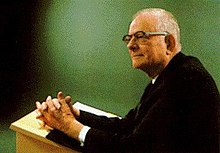Originally Posted by
noglider
This was during the period when Japan had adopted a philosophy of quality from an American innovator (whose name I've forgotten) and implemented it better than any other country.
Name:
W. Edwards Deming - Wiki
https://en.m.wikipedia.org/wiki/W._Edwards_DemingWilliam Edwards Deming (October 14, 1900 – December 20, 1993) was an American engineer, statistician, professor, author, lecturer, and management consultant. Educated initially as an
electrical engineer and later specializing in
mathematical physics, he helped develop the
sampling techniques still used by the U.S. Department of the Census and the Bureau of Labor Statistics.
W. Edwards Deming

Born October 14, 1900
Sioux City, Iowa Died December 20, 1993 (aged 93)
Washington, D.C. Alma mater
University of Wyoming BS
University of Colorado MS
Yale University PhD
Scientific career Fields Statistician Influences
Walter A. ShewhartIn his book
The New Economics for Industry, Government, and Education[1] Deming championed the work of
Walter Shewhart, including
statistical process control, operational definitions, and what Deming called the "Shewhart Cycle,"
[2] which had evolved into
Plan-Do-check-Act (PDCA). Deming is best known for his work in Japan after WWII, particularly his work with the leaders of Japanese industry. That work began in July and August 1950, in Tokyo and at the Hakone Convention Center,
[3] when Deming delivered speeches on what he called "Statistical Product Quality Administration". Many in Japan credit Deming as one of the inspirations for what has become known as the
Japanese post-war economic miracle of 1950 to 1960, when Japan rose from the ashes of war on the road to becoming the second-largest economy in the world through processes partially influenced by the ideas Deming taught:
[4]- Better design of products to improve service
- Higher level of uniform product quality
- Improvement of product testing in the workplace and in research centers
- Greater sales through side [global] markets
Deming is best known in the
United States for his 14 Points (
Out of the Crisis, by W. Edwards Deming, preface) and his system of thought he called the "System of Profound Knowledge". The system includes four components or "lenses" through which to view the world simultaneously:
- Appreciating a system
- Understanding variation
- Psychology
- Epistemology, the theory of knowledge[5]
Deming made a significant contribution to Japan's reputation for innovative, high-quality products, and for its economic power. He is regarded as having had more impact on Japanese manufacturing and business than any other individual not of Japanese heritage. Despite being honored in Japan in 1951 with the establishment of the Deming Prize, he was only just beginning to win widespread recognition in the U.S. at the time of his death in 1993.[6] President Ronald Reagan awarded him the National Medal of Technology in 1987. The following year, the National Academy of Sciences gave Deming the Distinguished Career in Science award.